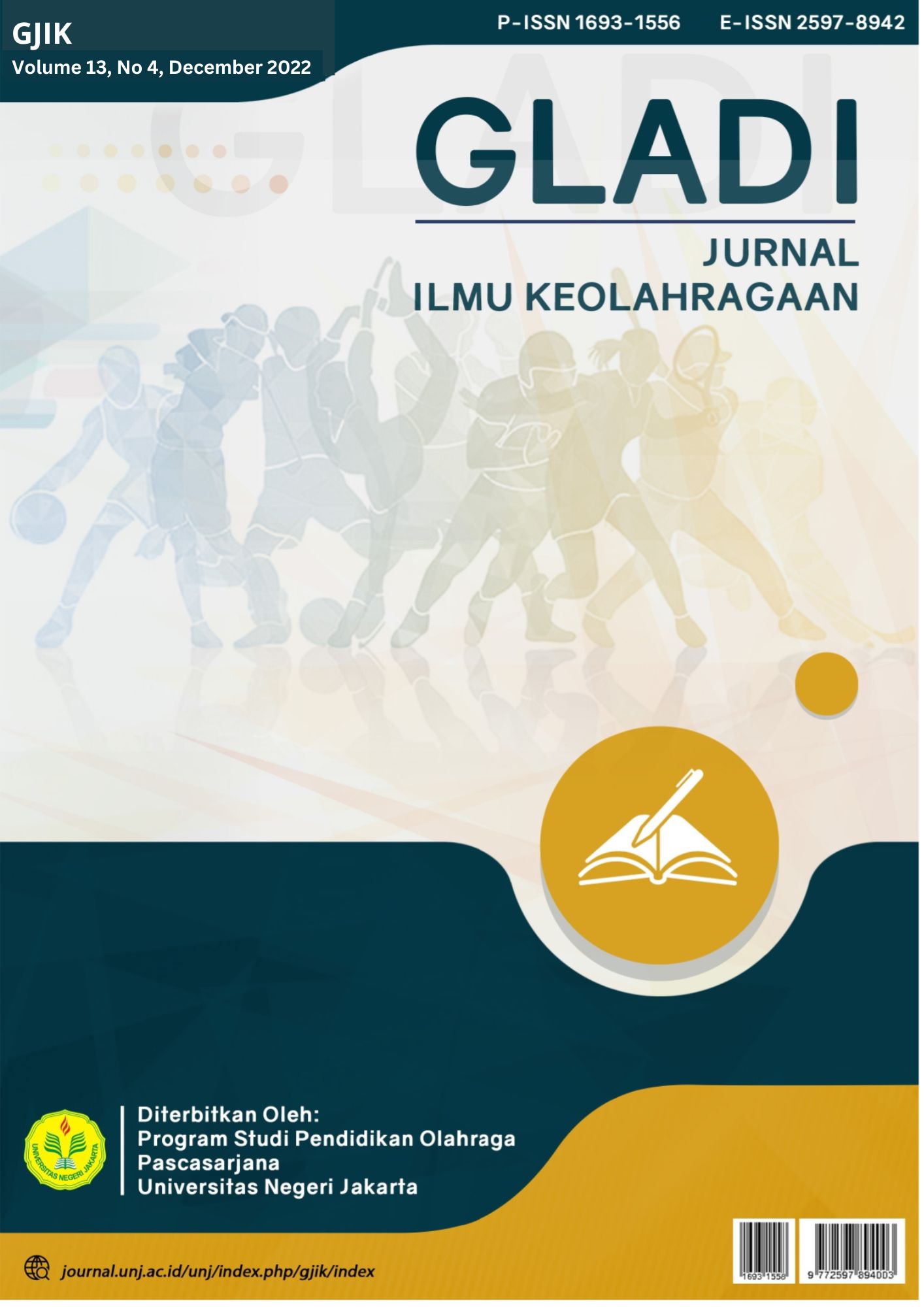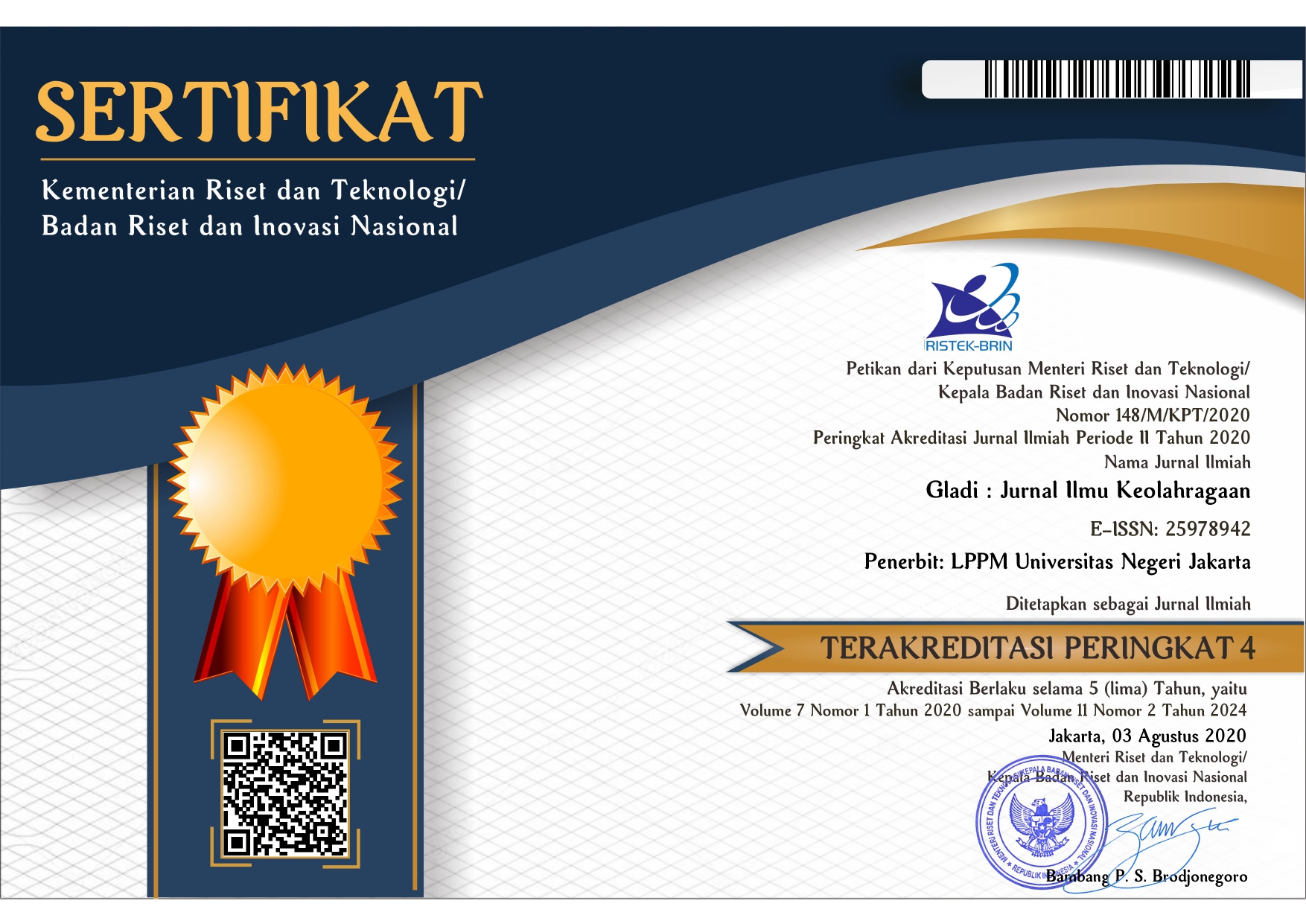The effect of coordination, concentration, and motivation on the skills of scoop and chair rhythmic gymnastics on students of sman 39 jakarta
DOI:
https://doi.org/10.21009/GJIK.134.04Keywords:
sensitive gymnastics; concentration; coordination; motivationAbstract
This study aims to determine the direct and indirect effects, as well as the simultaneous effect of exogenous variables with endogenous variables. The research method used is an associative quantitative approach, with test and measurement techniques. Data analysis technique using path analysis approach (Path Analysis). The population in this study is students of XII MIPA / IPS, SMAN 39 Jakarta, as many as 2 classes there are 72 students. The sampling technique in this research is total sampling. So the total sample in this study is 72 people. The instrument variable sensi exercise is measured by the sensi exercise test, the coordination variable used the Focus Light test, the concentration variable was measured by the Concentration Grid Test and the motivation variable is measured by the motivation questionnaire. The results of this study are the direct effect of variable X1 on Y 3 = 1.3% The direct effect of variable X2 on Y = 16.9%. The direct effect of variable X3 on Y 28.8% The direct effect of variable X1 on X3 =38.3%. The direct effect of the X2 variable on X3 is 45.3%. The indirect effect of variable X1 on Y through X3 = 2.076. The indirect effect of variable X2 on Y through X3 is 2.08. Based on the results of the study, it can be concluded that there are direct and indirect effects on the variables of coordination, concentration, motivation on sensi gymnastics.
Downloads
References
Anggara, F. (2021). Evaluasi Tingkat Pembelajaran Pendidikan Jasmani, Olahraga & Kesehatan Pada Masa Pandemi Pandemi Covid-19. Jurnal Ilmiah Bina Edukasi, 1(1), 37–45.
Hasibuan, N. R. F., Fauzi, T., & Novianti, R. (2020). Pengaruh kegiatan senam irama terhadap kecerdasan kinestetik pada anak kelompok b tk mustabaqul khoir Palembang. Jurnal Pendidikan Anak, 9(2), 118–123. https://doi.org/10.21831/jpa.v9i2.33564
Herlina, H., & Suherman, M. (2020). Potensi Pembelajaran Pendidikan Jasmani Olahraga Dan Kesehatan (Pjok) Di Tengah Pandemi Corona Virus Disease (Covid)-19 Di Sekolah Dasar. Tadulako Journal Sport Sciences And Physical Education, 8(1), 1–7. Retrieved from http://jurnal.untad.ac.id/jurnal/index.php/PJKR/article/view/16186
Jauhari, M. N., Sambira, & Zakiah, Z. (2020). Dampak Pandemi COVID-19 Terhadap Pelaksanaan Pembelajaran Penjas Adaptif di Sekolah Luar Biasa. Journal STAND: Sports and Development, 1(1), 9–22. Retrieved from http://jurnal.unipasby.ac.id/index.php/stand/about/submissions
Jayul, A., & Irwanto, E. (2020). Model Pembelajaran Daring Sebagai Alternatif Proses Kegiatan Belajar Pendidikan Jasmani di Tengah Pandemi Covid-19 Achmad. Jurnal Pendidikan Kesehatan Rekreasi, 6(2), 190–199.
Muchlisin, A., Pasaribu, N., & Mashuri, H. (2019). Peranan senam irama terhadap kebugaran jasmani untuk siswa sekolah dasar The role of rhythmic gymnastics for physical fitness for elementary school students. Jurnal SPORTIF : Jurnal Penelitian Pembelajaran, 5(1), 89–97.
Romadhoni, E., Wiharna, O., & Mubarak, I. (2019). Pengaruh Motivasi Belajar Terhadap Hasil Belajar Peserta Didik Pada Mata Pelajaran Gambar Teknik. Journal of Mechanical Engineering Education, 6(2), 228–234. https://doi.org/10.17509/jmee.v6i2.21799
Safitri, D. (2022). Evaluasi Peningkatan Gerak Koordinasi Pada Senam Kebugaran. Journal of SPORT, 2(2), 1–7.
Sahabuddin, S., Hakim, H., & Syahruddin, S. (2020). Kontribusi motor educability terhadap kemampuan senam ritmik alat simpai pada siswa sekolah dasar. Jurnal SPORTIF : Jurnal Penelitian Pembelajaran, 6(2), 449–465. https://doi.org/10.29407/js_unpgri.v6i2.14564
Sriwahyuniati, C. F. (2020). Senam Ritmik Dalam Paradigma Era Globalisasi. Jorpres (Jurnal Olahraga Prestasi), 15(2), 67–71.
Yulinda, O., & Abubakar, S. R. (2020). Vol. 3, No. 1, Maret 2020 Jurnal Riset Golden Age PAUD UHO. Jurnal Riset Golden Age PAUD UHO, 3(1), 98.







